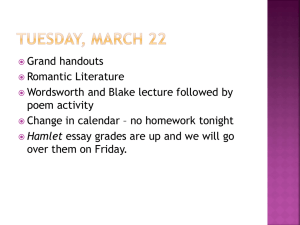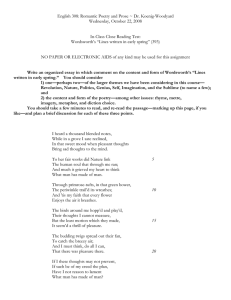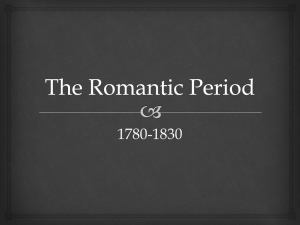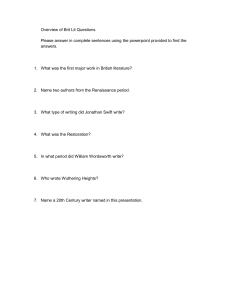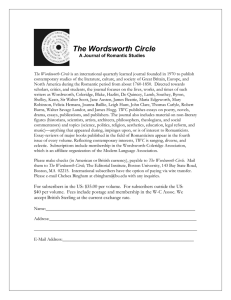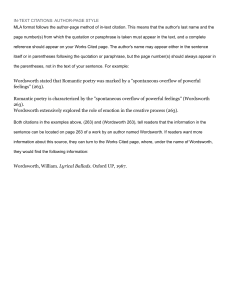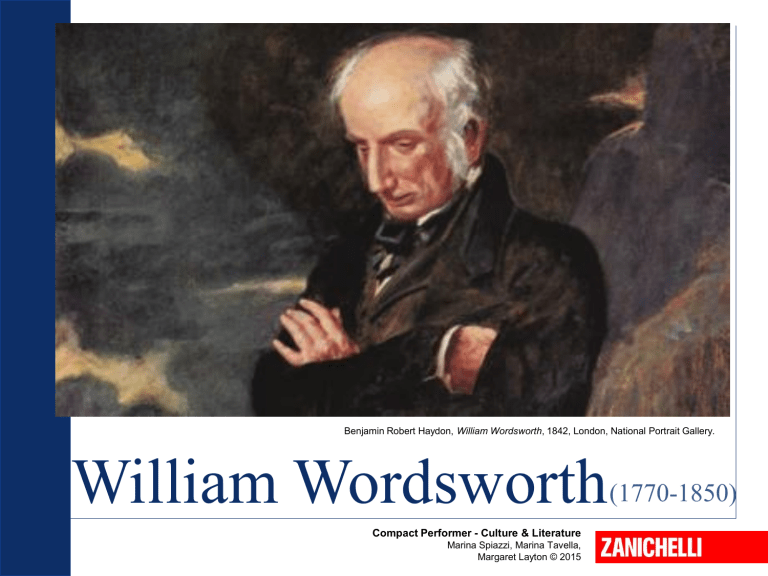
Benjamin Robert Haydon, William Wordsworth, 1842, London, National Portrait Gallery. William Wordsworth Compact Performer - Culture & Literature Marina Spiazzi, Marina Tavella, Margaret Layton © 2015 (1770-1850) William Wordsworth 1. Life • • • • Wordsworth’s House in Cockermouth, Cumberland Compact Performer - Culture & Literature Born in Cockermouth in Cumberland (Lake District) in 1770. His father, a lawyer, taught him poetry and allowed him access to his library. In 1791 he got a degree at St John’s College, Cambridge. In 1790 he went on a walking tour of France and the Alps; he was fascinated by the democratic ideals of Revolutionary France. William Wordsworth 1. Life • In 1792 he had a daughter, Caroline, from a French aristocratic woman, Annette Vallon. • The Reign of Terror and the war between England and France caused him to return to England. He was disappointed by the period of terror. • He went to live with his sister Dorothy, in close contact with nature, but for a few years he lived in Somerset, near his friend Coleridge, with whom he collaborated in the 1797-1799 period to write Lyrical Ballads. He got married with a childhood friend, Mary Hutchinson, and had 5 children. • • • In 1843 he became Poet Laureate. He became more conservative and went on writing poems until his death in 1850. Compact Performer - Culture & Literature William Wordsworth 2. Main works Together with Coleridge, he published: • Lyrical Ballads, with a Few Other Poems (1798). • Lyrical Ballads, with Other Poems (1800). This edition contains the famous Preface, the Manifesto of English Romanticism. William Wordsworth, Shreveport, James Smith Noel Collection Compact Performer - Culture & Literature William Wordsworth 3. Man and nature • Wordsworth is usually considered “the poet of nature”, but his poems contain very little natural description. •He was more interested in the relationship between the natural world and human consciousness. View of Buttermere, Crummock Water and the surrounding Fells from Fleetwith Pike in the English Lake District • He thought that man and nature are inseparable and that there are values in nature. It is from nature that man learns joy and love. • Wordsworth exploited the sensibility of the eye and ear to perceive the beauty of nature. Compact Performer - Culture & Literature William Wordsworth 4. What is poetry? From the Preface to Lyrical Ballads ‘Poetry is the spontaneous overflow of powerful feelings: it takes its origins from emotion recollected in tranquillity: the emotion is contemplated till by a species of reaction the tranquillity gradually disappears, and an emotion, kindred to that which was before the subject of contemplation, is gradually produced, and does itself actually exist in the mind’ Compact Performer - Culture & Literature William Wordsworth 4. The poetic process Poet Sensory Experience (in nature) Emotion Memory = Recollection In tranquillity Emotion Reader Compact Performer - Culture & Literature Poem similar emotion William Wordsworth 5. The poet’s task The poet = a teacher The poet has a greater sensibility than common man. He is considered as a prophet because through the power of his imagination he gets to the real knowledge of the world Shows men how to understand their feelings and improve their moral being. Compact Performer - Culture & Literature Draws attention to the ordinary things of life where the deepest emotions are to be found. William Wordsworth 6. Wordsworth’s style John Constable, The White Horse, 1819, New York, The Frick Collection Compact Performer - Culture & Literature • Wordsworth was interested in ordinary, everyday world and in the common life of simple, rustic people (which was full of moral values). • He used simple, everyday language, and was against poetic diction (= sophisticated language) William Wordsworth Daffodils (1807) 4 stanzas, regular rhyme scheme. This poem is not only about nature and daffodils, but also about the process of poetic creation. He starts from describing the world of nature, but is particularly interested in the effects of this world “inside” him, on his feelings. 1. The poet is walking alone in the countryside: he is melancholic and absentminded, he is compared to a cloud which wanders with no definite direction. Suddenly, he sees a field full of daffodils; the flowers are personalized (a crowd, a host; dancing).They first appear in a chaotic state (first stanza). 2. In the second stanza they appear as part of a universal order , and they are compared to the stars in the milky way. 3. The daffodils and the natural landscape around them communicate joy to the poet, who at first doesn’t realize how important this experience is for him. 4. There is a shift of time (he uses the present tense “I lie”): the poet is now in the tranquillity of his house, his heart fills with pleasure when he remembers the experience and his state of solitude becomes positive (“emotions recollected in tranquillity”, the necessary condition for poetic creation). Compact Performer - Culture & Literature William Wordsworth Comparison Wordsworth - Leopardi See handout: comparison between “Canto notturno…” and “My heart leaps up”: Both Leopardi and Wordsworth personify natural elements (the moon, the rainbow), they both give importance to youth (age of hope and illusions), and they both talk about the stages of human life. BUT: To Leopardi nature is indifferent to human suffering; life is just a sequence of painful moments, and parents have to console their children, adult life is painful. To Wordsworth nature is what accompanies and supports us throughout our whole life, giving us joy and relief. “The child is father of the man”: children have deeper feelings than adults and have something to teach them, they are a guide to man because they’re closer to nature. “My heart leaps up”: intense emotion (the sublime!) Compact Performer - Culture & Literature
